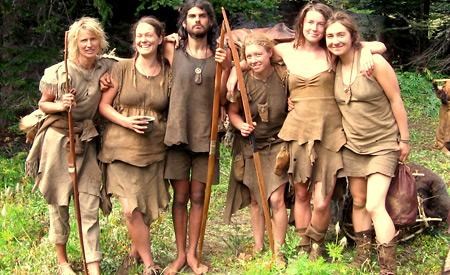A former resident of Vernon, BC, has relocated to the West Coast and taken to the wilderness to reduce her carbon footprint and hone her survival skills.
Living in an ecologically-responsible way and learning to subsist from nature was a dream that began for Daniella Roze when she was a child.
“My education began with a real passion for wanting to live off the land,” Roze said. “As a young child I was always drawing pictures of myself surrounded by lush forests. As I got older I began to ask how I could teach myself the skills required to undertake the lifestyle in a meaningful way and to teach others the skills I had learned.”
Recently, Roze challenged herself to a month-long wilderness survival experience in the mountains, something she intends to do annually. During the inaugural trip, Roze and a group of friends lived in the wilderness with only the buckskin clothing they fashioned and tools they made themselves. Their diet consisted only of foods found in the wild.
Roze is largely self-taught, acquiring invaluable skills during five years she spent living off the grid, with no running water and no electricity, on Vancouver Island. Miles Olson, a friend of Roze’s, wrote and published Unlearn, Rewild, a book about the experience that explores the deeper philosophies behind the choice to live off the grid in the wilderness.
A year-long program at the Wilderness Awareness School, founded by John Young, in Duvall, Washington, was also part of her ongoing education. Young wrote several books that Roze said were influential to her, including Coyote’s Guide to Connecting with Nature. “Attending that school provided me with the opportunity to have mentors and to focus on these skills in a big way.”
After a further nine-month apprenticeship at The Ancient Arts Center in Oregon, Roze added a handful of additional abilities, including basket weaving, a craft she said is fundamental in subsistence cultures. “When I was in West Africa I worked with a Canadian organization called One World Global Education. There I learned so much from many very skilled people. I glimpsed this possibility of really living with the land.”
Roze explained that when she first arrived she felt totally useless. “I was this adult 19-year-old woman and couldn’t cook over a fire, didn’t know how to paddle a dugout canoe, couldn’t catch fish. Baskets were really important to people; they carried everything they had or needed in baskets. Learning that was important and helped tie me to the land.”
Roze teaches a course on Cortes Island to young students on how to survive in nature, how to make shelter and fire, how to find wild foods and to track animals. “This summer I’m teaching a workshop at the University of British Columbia Okanagan,” she said. “I’m always seeking to collaborate with schools, institutions and like-minded organizations to continue the teaching.”
Roze said that interest in the art form and lifestyle is growing. “I saw early on that the world was hungry to have a deeper connection with the natural world,” she said. “By sharing these skills with my students and with others I’ve been able to see meaningful change take place.”
She is presenting Living in the Wild in the Stone Age, a slide show from 2 to 4 pm on Saturday, March 29 at Cranberry Community Hall by donation. On Sunday, March 30, she will run a full-day workshop Living Wild from 9 am to 5 pm. Tickets for the workshop are $80. Readers can register by email [email protected], or call 604.413.2209.



